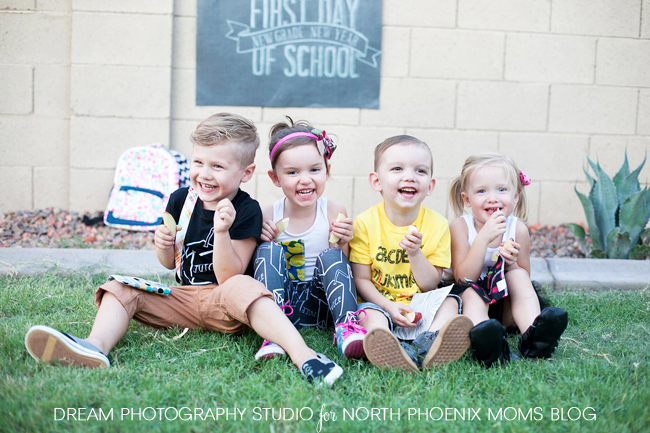Anyone who follows me on Pinterest has probably noticed the glut of classroom-related pins clogging up their feed (sorry!). It’s that time of year again- the weeks of nightmares about class, frantic perusals of Target ads for deals, and promises to get everything right this time. School starts for most kids within the next month, but your kid’s teacher has probably been prepping for this school year since the second week of summer.
It’s an exciting time for me, both as a teacher, and as a mom. My older daughter is starting preschool in August, and I can’t wait to enjoy this new time with her. I’ve been teaching middle school for a while now, and I love seeing that same enthusiasm in the parents of my seventh graders.
I’ve been reflecting a lot on my new understanding of my role as a teacher as I’ve grown more used to being a parent, and I realized that there are a few tips that I wish that the parents of my students knew before the school year began. So, lucky WVMB readers, here ya go!
Show Up– This seems obvious, but if you can at all swing it, show up to parent orientation night, performances, and conferences. Even if your kid is getting perfect grades, it means a lot to both your child and his/her teachers if you stop in, introduce yourself, and familiarize yourself with what’s going on in the classroom. I always feel more comfortable communicating with parents I’ve met in person, and I know I feel the same about the people that spend the day with my kids.
Be Aware– Know what your kid is learning, who their friends are, and how their day is going. If you know that your third grader is learning multiplication, practice times tables in line at the grocery store. Having your finger on the pulse of your kids’ friendships can be an early warning system for potential troubles. If your kid has been talking about the same group of students for a while and suddenly stops, this could be a great time to see which underlying issues are causing this. If your kid is old enough to be on Facebook, I can’t recommend strongly enough that you friend him or her. Not to be a micromanager, but to have a sense of how your child is feeling and interacting on a daily basis.
Foster Responsibility– In my ideal world, every one of my thirteen-year-old students would write down the assignments regularly and check his or her grades at least once a week. If this student was missing work (many schools have real-time assignment updating), I would hear from him or her first to arrange make it up, not the parents. I have a pretty strong hunch that the students who do take ownership in this way had parents who helped to build this habit at an early age. It’s never too early to teach your child that his or her learning is his responsibility (age appropriately, of course), and that teachers particularly respect students who are actively involved in their own success at school.
Communicate– The first week of school brings two homework assignments in my class: a letter from students to me, and a letter from parents describing their students to me. This a time for parents to brag about the special things they love about their kids, and, if they want, for them to let me know about potential concerns they may have. I appreciated learning that one girl’s family was going through a divorce, that one girl has some hearing loss so she needed to be seated in the front, and that one boy was going to be busy preparing for his Bar Mitzvah. We as teachers are here because we love kids and want to see them succeed, and we really appreciate when you let us know how we can best meet your child’s needs. One year, I had a student who consistently earned low grades. Not low enough to put him on the failure alert list, but low enough that he probably felt very discouraged about school. We were floored when his mom emailed us two weeks before school ended to tell us that he had Asperger’s Syndrome. Instantly, we started going back through our year, wishing that we could have done many things differently had we only known. Please keep your kid’s teachers in the loop, so we know how to best be here for him or her.
Be Nice– As parents, we teach our students that politeness and kindness are key to interacting with others. Ever heard it said that you can catch more flies with honey than you can with vinegar? A few years ago, I received emails from the parents of two boys in the same class. Both of these kids were straight-A students, and both moms were concerned that their sons were not going to be able to finish the assigned independent reading. The first mom took a very accusatory tone, saying that I had no idea how busy their family was, and that the assignment was simply unreasonable. She basically demanded that I reduce his assignment. The second parent also explained their son’s extra curricular commitments, but her approach was wildly different. She was polite with her tone and explained that her son had been faithfully working on his reading, but that he was becoming anxious about meeting the deadline. She asked if I would consider reducing his goal a little, but emphasized that she trusted my judgement as a teacher. I ended up adjusting both boys’ goals in the interest of consistency, but as a human being, it was much harder to work with the mom who sent the nastygram.
Remember We’re on the Same Team– At our school, parent conferences are first-come, first-serve, open-house style in the cafeteria. Parents sign up to meet with teachers and wait until their name is called. It’s not a very private environment- I can usually hear a few conferences surrounding me. A while back, we had a parent who strongly disagreed with the way another teacher was interacting with her son. She brought her son with her to conferences (which is totally normal, by the way), and had him join the conference (also not unusual). Halfway through the conference, I couldn’t help but hear this mom’s voice rising. She was being very harsh in her disagreements with this teacher, but her son stayed right next to her. From the next day onward, this student was an absolute terror in this teacher’s class, since he knew that his mom would not take his teacher seriously if there were any concerns. As parents, we know that it’s not a good idea to have a knock-down, drag-out argument with our partner in front of the kids; we need our kids to know we’re on the same team. As a teacher, I want to be on a team with my students’ parents. Disagreements happen, but it’s best for kids if they’re not stuck in the middle of one.
As I write this post on how to help your kids succeed in school, I know that there’s going to be a ton to learn as my kids grow older. Maybe, I, Miss Hyper-Organized, will have a daughter who can’t keep her assignments straight to save her life. There might be a year where I just can’t see eye-to-eye with my kid’s teacher. And, of course, my knowledge base is pretty limited. I’m familiar with the three-and-under crowd and young teens, but the middle is pretty vague to me. That said, I’d love to see what’s worked for you. Do you have any tips for your fellow moms on best supporting your kids as school starts? What do you do to foster responsibility in your kids?
Photo by Dream Photography Studio












